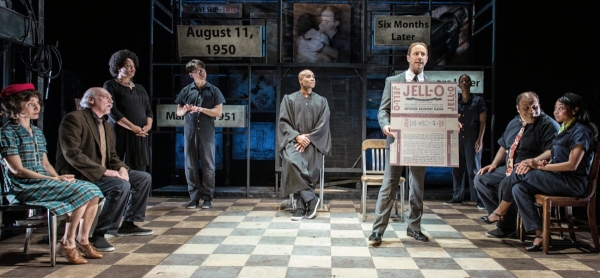Ethel Sings, The Unsung Song of Ethel Rosenberg
Sixty-one years after the execution of Ethel and Julius Rosenberg, playwright Joan Beber attempts to shed light on their story.

(© Russell Rowland)
It's usually not the best sign when the director's note is more enlightening about a subject than the actual play it accompanies. Such is the case with Joan Beber's Ethel Sings, The Unsung Song of Ethel Rosenberg, which is making its off-Broadway premiere at Theatre Row’s Beckett Theatre after running last summer at Walkerspace. Redundancies in the singsong title aside, the story of Ethel Rosenberg, the only woman to be executed for espionage during the Cold War (at, erm, Sing Sing prison), is an endlessly fascinating one. It also has major implications about our national identity that reverberate to this day. How exactly did the United States government come to execute two people who were convicted of a nonviolent crime, thereby orphaning two young children?
The event takes place in a prison where foreboding electrical equipment towers over the stage and inmates in blue prison jumpsuits shuffle across a dirty checkered floor. A tall-backed electric chair sits behind a scrim upstage center, a constant reminder of where we're headed (scenic design by John McDermott). The 10-person ensemble reenacts the story of Ethel Greenglass (Tracy Michailidis): her early interest in opera, how she joined the Young Communist League, and how she met her husband, Julius Rosenberg (Ari Butler). Julius is a committed Communist, worried about the plight of the Jewish people in Europe and convinced that the salvation of the world will come from Moscow. The play goes on to show how Julius and Ethel were arrested, tried, and sentenced to death for passing nuclear secrets to the Soviet Union.
Ethel is accompanied by her imaginary friend Loraine (Adrienne C. Moore), a mystical all-knowing multicultural earth mother who is probably named after Raisin in the Sun playwright Lorraine Hansberry. "Loraine [sic] was the first black playwright to have a Broadway show, and later the youngest to win a New York Drama Critics' Circle award," she sagely tells Ethel upon their first meeting. This is just one of the many factoids that fly at the audience over the course of the play. Beber has written a script that is Brechtian in its construct, simultaneously meant to instruct and entertain.
Appropriately, director Will Pomerantz's staging is meant to be fast-moving and athletic in its theatricality. In reality, it feels like a wardrobe sent through the wash one too many times: Nothing seems to fit. Loraine's quips and asides, written to provide desperately needed comic relief in this play about capital punishment, mostly fall flat. Multiple rotating signs on the set convey the passage of time, highlight key phrases, indicate the weather, and perform a hundred other tasks. (The convention keeps changing.) Rather than illuminate the story, this serves only to muddle things, making the upstage area appear increasingly like a giant Glenn Beck chalkboard drawing. A Fosse-esque musical number in the second act in which the Rosenbergs sing about how they're "sizzling" feels particularly ill-considered.
Ethel is most sympathetic in the moments she shares with her young sons, Michael (Serge Thony) and Robby (Kenneth Lee). We get the sense that she is a committed wife and mother. Michailidis navigates these passages beautifully, even as she contends with the awkwardness of two grown male actors playing young children. Lines like "Please Mr. President, don’t kill my mommy" are meant to tug at the heartstrings, but mostly they just leave you wincing.
Quoting Julius Rosenberg in his program note, Pomerantz writes, "There had to be a Rosenberg Case because there had to be an intensification of hysteria in America…there had to be hysteria and fear sent through America to get increased war budgets." This astute (if oversimplified) observation of the military-industrial complex and its relation to American justice seems the perfect jumping-off point for relating the Rosenberg story to the present. Unfortunately, Ethel Sings never connects the dots, try as it might. Instead, it veers off course into the realms of showmanship and overwrought sentimentality.
This is a story of powerful interests scapegoating an easy target to further their political goals. For all its fact-filled asides, Ethel Sings never enlightens its audience on the actual plight of Jews in Stalin's Soviet Union (contrary to Julius' utopian delusions). Nor does it show how the Rosenberg executions advanced the interests of hardliners in both the United States and the Soviet Union. The name of President Dwight Eisenhower is invoked multiple times, but the general-turned-president (who went on to warn against the military-industrial complex in his farewell address) is conspicuously silent in this tale.
Sixty-one years later, America is in a position to seriously reflect on how this event helped set the tone for our current political climate. Sadly, Ethel Sings doesn't offer that.









